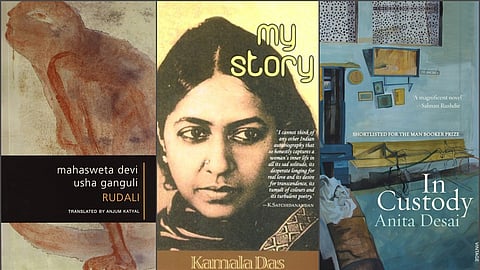Women's Day Special: Here are 7 must-read underrated books by eminent female writers of India!
On the occasion of International Women's Day, we're here with a list of 7 books written by fierce Indian women writers. While bibliophiles may have read famed works like 'The God of Small Things' by Arundhati Roy, Chitra Banerjee's 'The Palace of Illusions' or Shashi Deshpande's 'That Long Silence', we've listed works that are lesser-known but crucially entwined with the literary landscape of the country.
This March 8, let's celebrate these phenomenal women of yore! Check out the following 7 books (in no particular order) by Indian female writers that are sure to leave you awe-struck!
My Story (1976) by Kamala Das
One of the most powerful feminist voices of India's postcolonial period, who has not heard of Kamala Surayya Das?! The poet, till date, holds a prominent spot in the nation's literary canon and she is one writer everyone should know of. A confessional poet, Das was often compared to Sylvia Plath, Anne Sexton and more such puissant poets of the West.
So, as the foremost recommendation, we suggest the eminent poet's autobiographical work. Originally titled 'Ente Katha', the book was translated from Malayalam to English later. 'My Story' is a daring tale revolving around Kamala Das' life, troubles she faced in marriage and her evolution to becoming one of the most extolled writers in the country.
Ancient Ballads and Legends of Hindustan (1882) by Toru Dutt
First poetess of India, from Kolkata and one of the foremost Indian writers to compose works in English and French, Tarulatta Datta (or Toru Dutt) was a 19th-century poetess. She also happens to be among the founding figures of Indo-Anglian literature.
It is interesting to note that many have drawn parallels between the great romantic poet John Keats and Toru Dutt. The poetess has often been considered as the Indian Keats, owing to her mysticism of beauty in works and her short span of being a writer (as she passed away at merely 21).
Her work, 'Ancient Ballads and Legends of Hindustan' (1882) remains an invaluable piece of literature and poetry. It was posthumously published and is the first such work by a woman — a radical accomplishment. The collection of poems include ballads translated from Sanskrit into English, poems on Bengali folklore and her original English compositions.
In Custody (1984) by Anita Desai
One of the leading writers in feminist, postcolonial and diasporic literature, Anita Desai is also often considered as one of the pioneers of psychological novel in modern Indian English Literature. Poetic and descriptive, her works present strong motifs of alienation, nostalgia, cultural hybridity and more.
Desai, who has been nominated for the Booker Prize thrice, has numerous accolades to her name, including the Sahitya Akademi Award (1978) for 'Fire on the Mountain'. In 1984, In Custody was also shortlisted for the Booker Prize.
Set in the backdrop of New Delhi, In Custody deals with the poignant search for identity and meaning in life. While the protagonist Deven Sharma, a small town lecturer, gets a chance to interview his icon Nur Shahjahanabadi. The latter, who is shown to be one of the greatest living Urdu poets, holds many parallels to the rich language on the brink of extinction.
Rudali by Mahasweta Devi
Mahasweta Devi, an Indian writer and Bengali activist, was a raging voice for the marginalised. She worked tirelessly for the empowerment of tribal people of many Indian states and it is reflected in her celebrated works. Devi has been bestowed upon several literary honours, including Sahitya Akademi (1979), Jnanpith (1996) and Ramon Magsaysay (1996) awards. Numerous films have also been adapted from her works, including Rudali, where the latter garnered multiple awards.
Through Rudali, a powerful feminist text, Devi has conveyed the survival story of Sanichari, a lower-caste village woman, that throws light on the character's struggles and exploitation she faces. One of her other landmark novels is ‘Mother of 1084’.
A Life in Words (2013) by Ismat Chugtai
Yet again, Ismat Chugtai is one of the foremost feminists that India has produced and a woman writer who deserves to be celebrated till the end of time. Often placed among the four pillars of the modern Urdu short story canon, Chugtai stands at par with Saadat Hasan Manto, Rajinder Singh Bedi and Krishan Chander.
The Padma Shri awardee talks about major life events and shares them as interesting, hilarious episodes in her autobiography 'Kagazi Hain Pairhan' (translated in English as 'A Life In Words'). In a loosely constructed narrative, she expresses how it feels to be an aspiring writer and a woman living in an authoritarian and patriarchal world. From fighting for education to vociferously standing up for equality, and her struggles of facing controversies around her bold works, the writer highlights it all and more.
A revolutionary zeal going for it, the inspiring autobiography, around a life well lived, has the power of rendering hope to the readers!
Harvest (1997) by Manjula Padmanabhan
A journalist, playwright, comic strip artist and children's book author, Manjula Padmanabhan wears multiple feathers in her cap. Themes of science and technology, gender, equality and more run through her work, that is often considered ahead of its times. Another extremely poignant but realistic play by her is 'Lights Out', revolving around gang rape.
One must-read work of Padmanabhan's is 'Harvest', a play based on the hard-hitting theme of organ selling. The dystopian play opens in the future, in Bombay of 2010, where the imperialist first-world receivers are trading organs from third world donors. 'Harvest' not only won Padmanabhan the Onassis Award but also inspired an award-winning film 'Deham' by Govind Nihalani to be based on it.
Tomb of Sand (2018) by Geetanjali Shree
Geetanjali Shree, a Hindi-language novelist and short-story writer created waves in the literary industry when her work became the first Hindi novel translated in English to win the International Booker Prize in 2022. Recognised for her experimental style of writing, feminist narratives and poetic prose, Shree's works have been translated into various languages.
Her acclaimed 'Ret Samadhi', translated by Daisy Rockwell as 'Tomb of Sand', is a novel that travels from the nooks of partition to seeking identity and meaning.
On the surface, the book is about the life of 80-year-old Amma, suffering from pangs of depression after her husband's demise, awaiting her own death. But as the reader goes in depth, the undertones of the story highlight numerous social realistic concerns. The novel touches on motifs of invisibility of women, family dynamics, old age, borders and more.
To get all the latest content, download our mobile application. Available for both iOS & Android devices.

